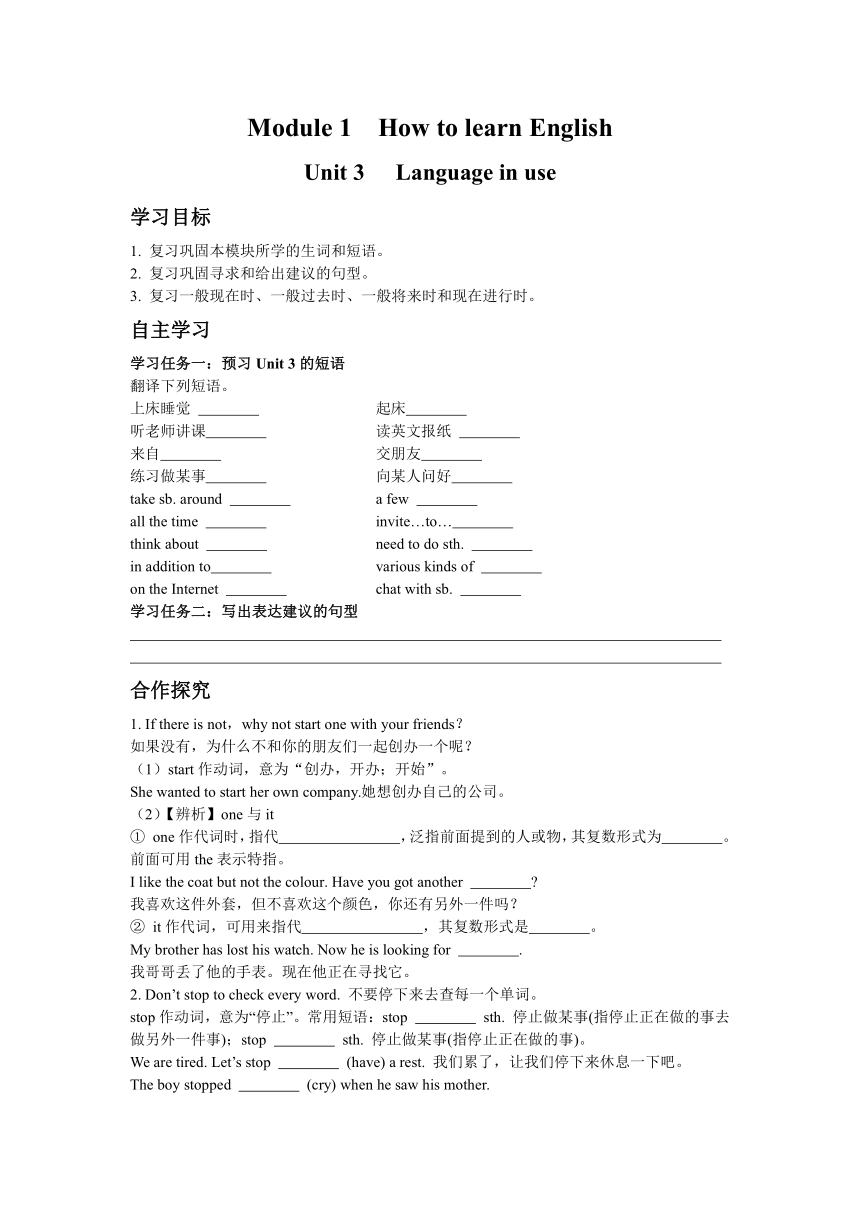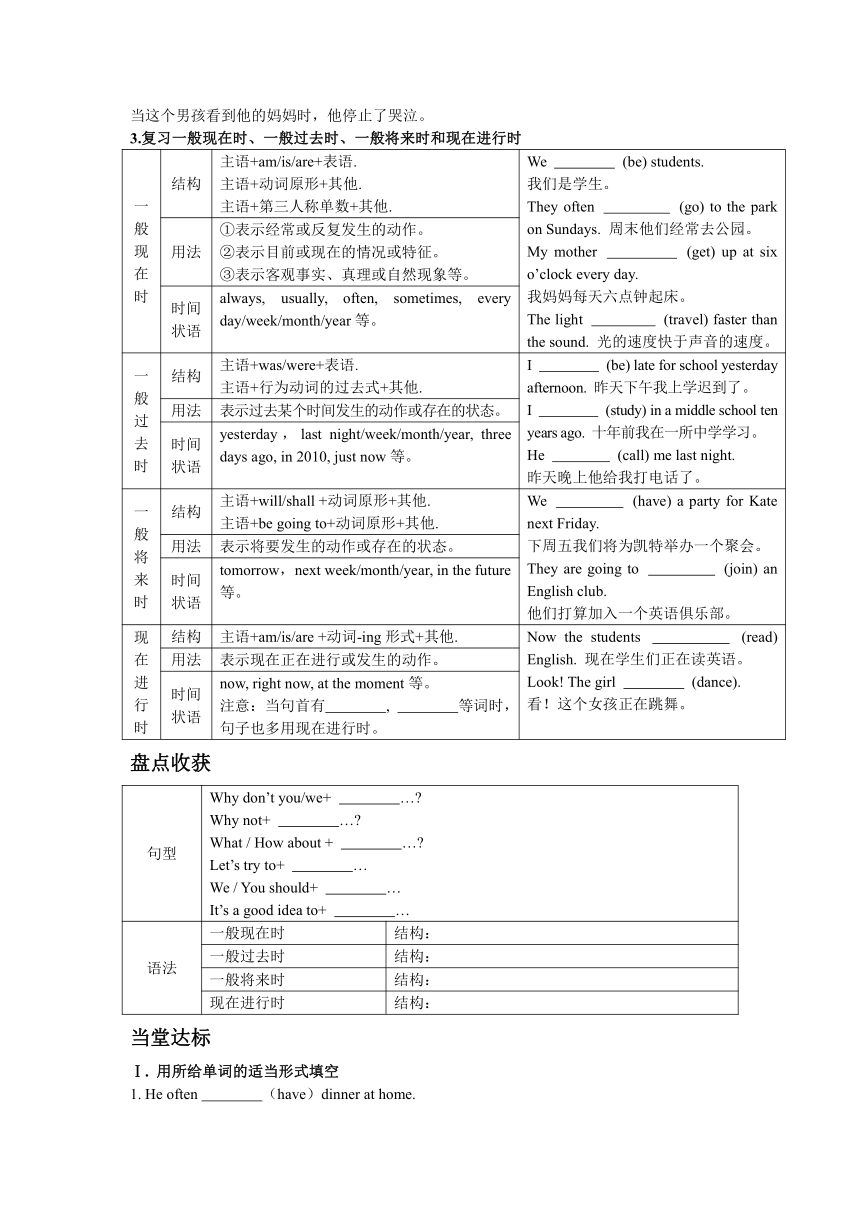外研版英语八年级上册 Module 1 How to learn English Unit 3学案
文档属性
| 名称 | 外研版英语八年级上册 Module 1 How to learn English Unit 3学案 |  | |
| 格式 | docx | ||
| 文件大小 | 21.1KB | ||
| 资源类型 | 教案 | ||
| 版本资源 | 外研版 | ||
| 科目 | 英语 | ||
| 更新时间 | 2023-06-13 14:04:34 | ||
图片预览


文档简介
Module 1 How to learn English
Unit 3 Language in use
学习目标
1. 复习巩固本模块所学的生词和短语。
2. 复习巩固寻求和给出建议的句型。
3. 复习一般现在时、一般过去时、一般将来时和现在进行时。
自主学习
学习任务一:预习Unit 3的短语
翻译下列短语。
上床睡觉 起床
听老师讲课 读英文报纸
来自 交朋友
练习做某事 向某人问好
take sb. around a few
all the time invite…to…
think about need to do sth.
in addition to various kinds of
on the Internet chat with sb.
学习任务二:写出表达建议的句型
合作探究
1. If there is not,why not start one with your friends?
如果没有,为什么不和你的朋友们一起创办一个呢?
(1)start作动词,意为“创办,开办;开始”。
She wanted to start her own company.她想创办自己的公司。
(2)【辨析】one与it
① one作代词时,指代 ,泛指前面提到的人或物,其复数形式为 。前面可用the表示特指。
I like the coat but not the colour. Have you got another
我喜欢这件外套,但不喜欢这个颜色,你还有另外一件吗?
② it作代词,可用来指代 ,其复数形式是 。
My brother has lost his watch. Now he is looking for .
我哥哥丢了他的手表。现在他正在寻找它。
2. Don’t stop to check every word. 不要停下来去查每一个单词。
stop作动词,意为“停止”。常用短语:stop sth. 停止做某事(指停止正在做的事去做另外一件事);stop sth. 停止做某事(指停止正在做的事)。
We are tired. Let’s stop (have) a rest. 我们累了,让我们停下来休息一下吧。
The boy stopped (cry) when he saw his mother.
当这个男孩看到他的妈妈时,他停止了哭泣。
3.复习一般现在时、一般过去时、一般将来时和现在进行时
一 般 现 在 时 结构 主语+am/is/are+表语. 主语+动词原形+其他. 主语+第三人称单数+其他. We (be) students. 我们是学生。 They often (go) to the park on Sundays. 周末他们经常去公园。 My mother (get) up at six o’clock every day. 我妈妈每天六点钟起床。 The light (travel) faster than the sound. 光的速度快于声音的速度。
用法 ①表示经常或反复发生的动作。 ②表示目前或现在的情况或特征。 ③表示客观事实、真理或自然现象等。
时间状语 always, usually, often, sometimes, every day/week/month/year等。
一 般 过去 时 结构 主语+was/were+表语. 主语+行为动词的过去式+其他. I (be) late for school yesterday afternoon. 昨天下午我上学迟到了。 I (study) in a middle school ten years ago. 十年前我在一所中学学习。 He (call) me last night. 昨天晚上他给我打电话了。
用法 表示过去某个时间发生的动作或存在的状态。
时间状语 yesterday,last night/week/month/year, three days ago, in 2010, just now等。
一 般 将来时 结构 主语+will/shall +动词原形+其他. 主语+be going to+动词原形+其他. We (have) a party for Kate next Friday. 下周五我们将为凯特举办一个聚会。 They are going to (join) an English club. 他们打算加入一个英语俱乐部。
用法 表示将要发生的动作或存在的状态。
时间状语 tomorrow,next week/month/year, in the future等。
现在进行时 结构 主语+am/is/are +动词-ing形式+其他. Now the students (read) English. 现在学生们正在读英语。 Look! The girl (dance). 看!这个女孩正在跳舞。
用法 表示现在正在进行或发生的动作。
时间状语 now, right now, at the moment等。 注意:当句首有 , 等词时,句子也多用现在进行时。
盘点收获
句型 Why don’t you/we+ … Why not+ … What / How about + … Let’s try to+ … We / You should+ … It’s a good idea to+ …
语法 一般现在时 结构:
一般过去时 结构:
一般将来时 结构:
现在进行时 结构:
当堂达标
Ⅰ. 用所给单词的适当形式填空
1. He often (have)dinner at home.
2. What they always (do)on Saturdays
3. Listen! The girl (sing)in the next room.
4. We (go)to the zoo yesterday,and we (go)to the park tomorrow.
5. My brother (visit)his teacher next Sunday.
Ⅱ. 单项填空
1. —Excuse me, I want some books, but I can’t find a bookstore here.
—I know on my way e with me, please.
A. one B. this C. it D. that
2. She told us the good news with smile her face.
A. a; in B. an; in C. a; on D. an; on
3. Can you _ this letter from German English
A. translate; by B. translation; by
C. translate; into D. translation; into
4. Nowadays more and more elder people Beijing Opera.
A. enjoyed B. enjoying C. to enjoy D. enjoy
5. —How about him
—He just gave me advice.
A. a B. an C. many D. some
6. —Why don’t the doctors stop lunch
—Because they are busy saving a patient.
A. have B. having C. to have D. has
Ⅲ. 根据提示将下列句子翻译成英语
1. 为什么不和我去购物呢?(Why not ... )
2. 让我们去公园吧。(Let’s ...)
3. 你应该先完成家庭作业。(should)
4. 放学后打篮球怎么样?(How about ... )
5. 你离开时记得关门。(remember to do sth.)
学后反思
当堂达标答案与解析:
Ⅰ. 1. has 由often(经常)可知该句用一般现在时,主语是第三人称单数,故谓语动词用第三人称单数形式。have的第三人称单数形式是has。
2. do,do 由always(总是)可知该句用一般现在时,谓语动词是行为动词do,主语是they,特殊疑问句要借助助动词do。
3. is singing 由“Listen!(听!)”可知,该句用现在进行时,主语是第三人称单数,故be动词用is。
4. went,will go 前一分句中的时间状语是yesterday,故用一般过去时;后一分句中的时间状语是tomorrow,故用一般将来时。
5. will visit 由时间状语next Sunday(下周日)可知该句用一般将来时。
Ⅱ. 1. A one泛指前面提到的同类人或物中的一个;this意为“这个”,指较近距离;it特指前面提到的同一人或物;that意为“那个”,指较远距离。根据语境可知,此处泛指在回家路上的一个书店,故选A。句意:“打扰一下,我想要(买)一些书,但在这里我找不到书店。”“我知道在我回家的路上有一家。请跟我来。”
2. C with a smile on one’s face意为“某人的脸上带着微笑”,为固定短语。
3. C translate…from…into…意为“把……从……翻译成……”,为固定搭配。
4. D 句意:现在越来越多的老人喜欢京剧。由句意可知,本句应用一般现在时,故选D。
5. D advice为不可数名词,不能用a,an或many修饰,排除A、B、C三项,故选D。
6. C stop to do sth. 表示停止当前所做的事情去做另外一件事情;stop doing sth. 表示停止正在做的事情。由答语句意“因为他们忙着拯救一个病人”可知,上句询问“医生们为什么不停下来吃午饭?”故选C。
Ⅲ. 1. Why not go shopping with me
2. Let’s go to the park.
3. You should finish your homework first.
4. How about playing basketball after school
5. Remember to close the door when you leave.
Unit 3 Language in use
学习目标
1. 复习巩固本模块所学的生词和短语。
2. 复习巩固寻求和给出建议的句型。
3. 复习一般现在时、一般过去时、一般将来时和现在进行时。
自主学习
学习任务一:预习Unit 3的短语
翻译下列短语。
上床睡觉 起床
听老师讲课 读英文报纸
来自 交朋友
练习做某事 向某人问好
take sb. around a few
all the time invite…to…
think about need to do sth.
in addition to various kinds of
on the Internet chat with sb.
学习任务二:写出表达建议的句型
合作探究
1. If there is not,why not start one with your friends?
如果没有,为什么不和你的朋友们一起创办一个呢?
(1)start作动词,意为“创办,开办;开始”。
She wanted to start her own company.她想创办自己的公司。
(2)【辨析】one与it
① one作代词时,指代 ,泛指前面提到的人或物,其复数形式为 。前面可用the表示特指。
I like the coat but not the colour. Have you got another
我喜欢这件外套,但不喜欢这个颜色,你还有另外一件吗?
② it作代词,可用来指代 ,其复数形式是 。
My brother has lost his watch. Now he is looking for .
我哥哥丢了他的手表。现在他正在寻找它。
2. Don’t stop to check every word. 不要停下来去查每一个单词。
stop作动词,意为“停止”。常用短语:stop sth. 停止做某事(指停止正在做的事去做另外一件事);stop sth. 停止做某事(指停止正在做的事)。
We are tired. Let’s stop (have) a rest. 我们累了,让我们停下来休息一下吧。
The boy stopped (cry) when he saw his mother.
当这个男孩看到他的妈妈时,他停止了哭泣。
3.复习一般现在时、一般过去时、一般将来时和现在进行时
一 般 现 在 时 结构 主语+am/is/are+表语. 主语+动词原形+其他. 主语+第三人称单数+其他. We (be) students. 我们是学生。 They often (go) to the park on Sundays. 周末他们经常去公园。 My mother (get) up at six o’clock every day. 我妈妈每天六点钟起床。 The light (travel) faster than the sound. 光的速度快于声音的速度。
用法 ①表示经常或反复发生的动作。 ②表示目前或现在的情况或特征。 ③表示客观事实、真理或自然现象等。
时间状语 always, usually, often, sometimes, every day/week/month/year等。
一 般 过去 时 结构 主语+was/were+表语. 主语+行为动词的过去式+其他. I (be) late for school yesterday afternoon. 昨天下午我上学迟到了。 I (study) in a middle school ten years ago. 十年前我在一所中学学习。 He (call) me last night. 昨天晚上他给我打电话了。
用法 表示过去某个时间发生的动作或存在的状态。
时间状语 yesterday,last night/week/month/year, three days ago, in 2010, just now等。
一 般 将来时 结构 主语+will/shall +动词原形+其他. 主语+be going to+动词原形+其他. We (have) a party for Kate next Friday. 下周五我们将为凯特举办一个聚会。 They are going to (join) an English club. 他们打算加入一个英语俱乐部。
用法 表示将要发生的动作或存在的状态。
时间状语 tomorrow,next week/month/year, in the future等。
现在进行时 结构 主语+am/is/are +动词-ing形式+其他. Now the students (read) English. 现在学生们正在读英语。 Look! The girl (dance). 看!这个女孩正在跳舞。
用法 表示现在正在进行或发生的动作。
时间状语 now, right now, at the moment等。 注意:当句首有 , 等词时,句子也多用现在进行时。
盘点收获
句型 Why don’t you/we+ … Why not+ … What / How about + … Let’s try to+ … We / You should+ … It’s a good idea to+ …
语法 一般现在时 结构:
一般过去时 结构:
一般将来时 结构:
现在进行时 结构:
当堂达标
Ⅰ. 用所给单词的适当形式填空
1. He often (have)dinner at home.
2. What they always (do)on Saturdays
3. Listen! The girl (sing)in the next room.
4. We (go)to the zoo yesterday,and we (go)to the park tomorrow.
5. My brother (visit)his teacher next Sunday.
Ⅱ. 单项填空
1. —Excuse me, I want some books, but I can’t find a bookstore here.
—I know on my way e with me, please.
A. one B. this C. it D. that
2. She told us the good news with smile her face.
A. a; in B. an; in C. a; on D. an; on
3. Can you _ this letter from German English
A. translate; by B. translation; by
C. translate; into D. translation; into
4. Nowadays more and more elder people Beijing Opera.
A. enjoyed B. enjoying C. to enjoy D. enjoy
5. —How about him
—He just gave me advice.
A. a B. an C. many D. some
6. —Why don’t the doctors stop lunch
—Because they are busy saving a patient.
A. have B. having C. to have D. has
Ⅲ. 根据提示将下列句子翻译成英语
1. 为什么不和我去购物呢?(Why not ... )
2. 让我们去公园吧。(Let’s ...)
3. 你应该先完成家庭作业。(should)
4. 放学后打篮球怎么样?(How about ... )
5. 你离开时记得关门。(remember to do sth.)
学后反思
当堂达标答案与解析:
Ⅰ. 1. has 由often(经常)可知该句用一般现在时,主语是第三人称单数,故谓语动词用第三人称单数形式。have的第三人称单数形式是has。
2. do,do 由always(总是)可知该句用一般现在时,谓语动词是行为动词do,主语是they,特殊疑问句要借助助动词do。
3. is singing 由“Listen!(听!)”可知,该句用现在进行时,主语是第三人称单数,故be动词用is。
4. went,will go 前一分句中的时间状语是yesterday,故用一般过去时;后一分句中的时间状语是tomorrow,故用一般将来时。
5. will visit 由时间状语next Sunday(下周日)可知该句用一般将来时。
Ⅱ. 1. A one泛指前面提到的同类人或物中的一个;this意为“这个”,指较近距离;it特指前面提到的同一人或物;that意为“那个”,指较远距离。根据语境可知,此处泛指在回家路上的一个书店,故选A。句意:“打扰一下,我想要(买)一些书,但在这里我找不到书店。”“我知道在我回家的路上有一家。请跟我来。”
2. C with a smile on one’s face意为“某人的脸上带着微笑”,为固定短语。
3. C translate…from…into…意为“把……从……翻译成……”,为固定搭配。
4. D 句意:现在越来越多的老人喜欢京剧。由句意可知,本句应用一般现在时,故选D。
5. D advice为不可数名词,不能用a,an或many修饰,排除A、B、C三项,故选D。
6. C stop to do sth. 表示停止当前所做的事情去做另外一件事情;stop doing sth. 表示停止正在做的事情。由答语句意“因为他们忙着拯救一个病人”可知,上句询问“医生们为什么不停下来吃午饭?”故选C。
Ⅲ. 1. Why not go shopping with me
2. Let’s go to the park.
3. You should finish your homework first.
4. How about playing basketball after school
5. Remember to close the door when you leave.
同课章节目录
- Module 1 How to learn English
- Unit 1 Let's try to speak English as much as possi
- Unit 2 You should smile at her.
- Unit 3 Language in use .
- Module 2 My home town and my country
- Unit 1 It's taller than many other buildings.
- Unit 2 Cambridge is a beautiful city in the east o
- Unit 3 Language in use .
- Module 3 Sports.
- Unit 1 Nothing is more exciting than playing tenni
- Unit 2 This year we training more carefully.
- Unit 3 Language in use .
- Module 4 Planes, ships and trains .
- Unit 1 He lives the farthest from school.
- Unit 2 What is the best way to travel.
- Unit 3 Language in use .
- Module 5 Lao She Teahouse.
- Unit 1 I wanted to see the Beijing Opera.
- Unit 2 It descibes the changes in Chinese society.
- Unit 3 Language in use .
- Module 6 Animals in danger.
- Unit 1 It allows people to get closer to them .
- Unit 2 The WWF is working hard to save them all.
- Unit 3 Language in use .
- Revision module A
- Module 7 A famous story
- Unit 1 Alice was sitting with her sister by the ri
- Unit 2 She was thinking about her cat.
- Unit 3 Language in use .
- Module 8 Accidents
- Unit 1 While the car were changing to red, a car s
- Unit 2 I was trying to pick it up when it bite me
- Unit 3 Language in use .
- Module 9 Population
- Unit 1 The population of China is about 1.37 billi
- Unit 2 Arnwick was a city with 200,000 people.
- Unit 3 Language in use .
- Module 10 The weathe
- Unit 1 It might snow.
- Unit 2 The weather is fine all year round.
- Unit 3 Language in use .
- Module 11 Way of life
- Unit 1 In China ,we open a gift later.
- Unit 2 In England, you usually drink tea with milk
- Unit 3 Language in use .
- Module 12 Help
- Unit 1 What should we do before help arrives?
- Unit 2 Stay away from windows and heavy furniture.
- Unit 3 Language in use .
- Revision module B
